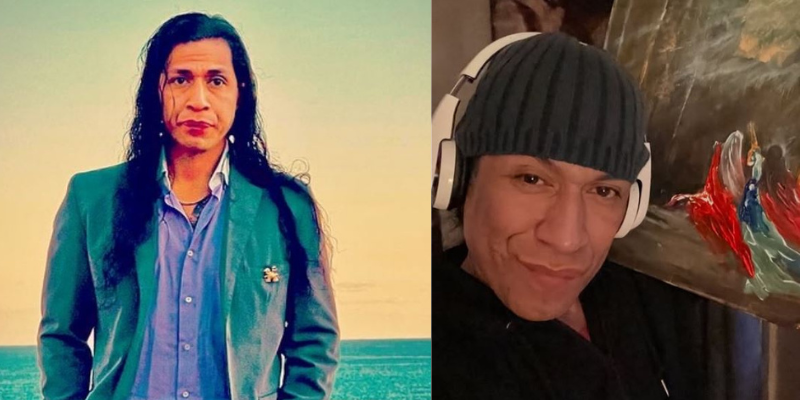With an estimated net worth of $500,000, Rudy Youngblood provides a particularly remarkable look at an actor who advanced through the film industry swiftly while navigating a historically slow-to-uplift Indigenous voices. When compared to the magnitude of that impact, the financial reward appears modest at best, but his role in Apocalypto remains both his defining achievement and a cultural reference point.
Rudy was born in Belton, Texas, and his early life was influenced by hardship and tenacity. He was raised mostly by his mother, who he believes is of Comanche ancestry. He assisted in taking care of two younger sisters and dealt with the psychological effects of his mother’s alcoholism. Rudy overcame these obstacles to become a talented athlete and artist who was awarded scholarships in both disciplines. Superbly motivated, he decided to study Native dance rather than go to college, which allowed him to tour with the American Indian Dance Theatre and strengthen his ties to his heritage.
Rudy Youngblood – Personal and Career Information
| Detail | Information |
|---|---|
| Full Name | Rudy Youngblood |
| Birthdate | September 21, 1982 |
| Birthplace | Belton, Texas, USA |
| Age | 42 |
| Nationality | American |
| Ethnicity | Comanche (maternal), Yaqui (paternal) |
| Height | 5 ft 11 in (180 cm) |
| Occupation | Actor, Musician, Dancer, Visual Artist |
| Known For | Lead role as Jaguar Paw in Apocalypto (2006) |
| Languages Spoken | English, Spanish, Yucatec Maya |
| Years Active | 1990s–present |
| Net Worth | $500,000 |
| Notable Work | Apocalypto, Wind Walkers, Beatdown |
| Advocacy Work | HIV/AIDS Awareness, Indigenous Rights, Youth Education |
His ascent to fame was abrupt and unorthodox. Rudy, who was cast as Jaguar Paw in Mel Gibson’s historical action drama Apocalypto (2006), gave a powerful and emotionally stirring performance. His immersive dedication is demonstrated by the fact that he learned the Yucatec Maya language for the role and performed his own stunts. Due to the film’s success, he was able to reach a worldwide audience and win a First Americans in the Arts Best Actor award. However, Rudy’s journey took a different turn than that of many of his peers who turn a breakthrough role into mainstream stardom.
Historically, opportunities for actors of Native descent have been scarce and frequently characterized by stereotypes. Even Wes Studi and Adam Beach, who have achieved great success, endured years of underrepresentation and typecasting. This reality is reflected in Rudy’s career. His later works, including Wind Walkers, Beatdown, and a few lesser-known titles, didn’t get the same level of distribution or promotional support despite his impressive debut. His ability to command higher salaries or accumulate residual-based wealth was severely diminished by this unequal exposure, which eventually had an impact on his financial situation.
Conflicts over his ancestry further complicated his public persona. Citing conflicting family statements and exclusions from tribal rolls, some questioned his Comanche ancestry. In response to the debate, Rudy emphasized cultural experience over genetic evidence, stating that his identity was ceremoniously shaped by his late adoptive father, Preston Tahchawwickah. Even though these conversations were private, they were emphasized in the media and occasionally eclipsed his creative output.
Outside of the screen, Rudy has been very involved in advocacy, especially in the areas of Indigenous health and HIV awareness. He has visited hospitals and taken part in community outreach because he lost a family member to complications from AIDS. His efforts to raise awareness of topics that are frequently ignored by the mainstream, like the disproportionately high infection rates among Native populations, are remarkably successful.
However, legal issues have occasionally overshadowed the promise of his social impact. Rudy was taken into custody on December 27, 2024, in Athens, Greece, for allegedly brandishing a knife in a threat against a police officer. He was reported to have overstayed his visa and to have looked drunk. Although the incident was concerning, it also brought to light more serious problems that many actors encounter following unexpected stardom and erratic work, possibly relating to burnout or mental health. Media coverage quickly shifted from praising to criticizing, a cycle that is all too common for marginalized celebrities.
Rudy keeps making despite obstacles. He creates music, paints, and has a devoted social media following where he posts enigmatic, poetic thoughts on spiritual resiliency, identity, and adversity. His frequently unvarnished and heartfelt content appeals to fans who see him as more than just a Hollywood star; rather, they see him as someone who is genuinely balancing activism, fame, and heritage.
Rudy’s journey feels very personal in comparison to other Indigenous actors who experienced comparable surges in recognition. Irene Bedard, for example, voiced Pocahontas in the Disney animated classic, but she has since mostly worked in independent films and television. Like Rudy, she didn’t become extremely wealthy as a result of her fame, but she did leave a lasting cultural mark. Similar to this, Adam Beach struggled to land roles of equal depth after making his breakthrough with Smoke Signals and Windtalkers.
The desire for authentic representation has significantly increased over the last ten years. Indigenous stories are increasingly being told through Indigenous perspectives on shows like Reservation Dogs and Dark Winds. Younger actors and writers have benefited greatly from these changes, but they also give hope for artists like Rudy to resurface—not as artifacts from a bygone era, but as trailblazers whose tales have endured.
His $500,000 net worth is a reflection of more than just royalties and contracts. It captures a larger conflict in the film business, where cultural significance and artistic contribution are not always compensated with money. Rudy’s influence is far greater than his income by most measures. It is impossible to quantify his capacity to engage with marginalized communities, use his position for worthwhile causes, and represent Indigenous pride internationally.



